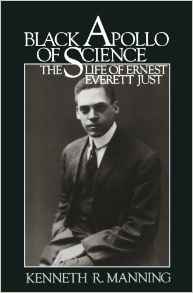Dr. Ernest Everett Just:
Black Apollo of Science
Dr. Ernest E. Just was one of the first African Americans to receive worldwide recognition as a scientist. Born August 14, 1883 in Charleston, , Just was only four years old when his father, Charles Fraser Just, died in 1887.
Due to mounting debt, his mother, Mary Just, moved with her children from Charleston to James Island, a Gullah community off the coast of South Carolina to work in its phosphate mines.
While on the Island, Mary Just became a highly respected leader of the community and convinced a number of residents on the Island to purchase land and start their own community.
The residents renamed the community Maryville in her honor. In 1896 Just was sent to attend the high school of the Colored Normal Industrial, Agricultural & Mechanical College (later named ).
Believing that he would receive a superior education by attending a college preparatory school in the North, Just enrolled in Kimball Union Academy in in 1900.
Although he was Kimball Union's only black student, Just recalled being in a warm and welcoming environment where he excelled in social activities and academics.
After graduation from Kimball Union, Just entered Dartmouth College in 1903. In contrast to his experience at Kimball Union, Just felt alone and socially isolated at Dartmouth.
Nonetheless, Just graduated magna cum laude in biology in 1907 and took a minor in history. He was also elected to Phi Beta Kappa.
After receiving his degree Just accepted a position at as an instructor of rhetoric and English and in 1910 later joined the Department of Biology. He was appointed Professor in the Department in 1912.
While at Howard Just helped to found Fraternity in 1911. Omega Psi Phi was the first black Greek letter organization founded at a historically black university.
Just worked for many years at the Marine Biological Laboratory in Woods Hole, Massachusetts.
At the laboratory, Just realized that a doctorate in the sciences was key to his success and he began a program of self-study at the University of and later earned a doctorate in 1916.
After completing his doctorate Just published 50 scientific papers and two influential books, (1922) and (1939).

Despite his Ph.D., Just could not find work at any major American university. He moved to and continued his research in Naples, .
In 1930, however, Just became the first American to be invited to conduct research at the Kaiser Wilhelm Institute in Berlin, . His research ended when the Nazis took control of Germany in 1933. Just relocated to Paris, to continue his research.
Just married Ethel Highwarden in 1912. The couple had three children but the marriage suffered due to his long absences from home.
He and Ethel divorced in 1939. That same year Just married Maid Hedwig Schnetzler, a German national. Ernest Just was working at the Station Biologique in Roscoff, France when the Germans invaded the country.
He was held briefly in a prisoner-of-war camp until rescued by the US State Department and brought back to the US in 1940.
Just had been ill for months before his incarceration as a POW but his condition deteriorated during his imprisonment and on the return journey to the United States. He died on October 27, 1941 in Washington, D.C. , shortly after being diagnosed with pancreatic cancer.
Source: I. W. Gabriel Selassie in blackpast.org
